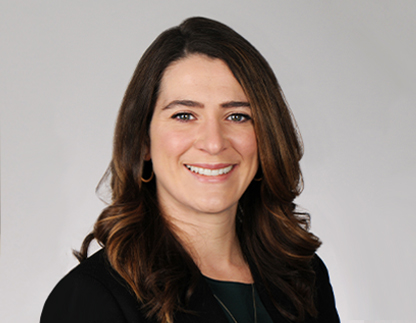Helping people has always been the motivation behind what I do, whether that's working directly with patients or in my research.”
Erin Reedy (she/her)
Postdoctoral Fellow in the Department of Communication Sciences and Disorders

Erin is a postdoctoral fellow in the Department of Communication Sciences and Disorders in the School of Communication. Her research and clinical interests regard the interrelationships between oral, pharyngeal, and esophageal aspects of swallowing/swallowing disorders, aerodigestive disorders, and primary disorders of the esophagus.
How would you describe your research and/or work to a non-academic audience?
I am a clinician-scientist who works with and studies people with swallowing disorders. My work focuses on patients with difficulty swallowing and how that relates to coordination with breathing and the movement of food and drink through the esophagus (i.e., the passage to the stomach).
What have been some of the most memorable twists and turns of your career?
I worked for 8 years as a medical speech pathologist (SLP) before deciding to transition into a career in research.
Tell us what inspired your research and/or work.
Because I have a clinical background and intend to maintain some degree of clinical work throughout my career, I draw on real-life experiences to help inform my research. Any good research idea I've had comes from a clinical experience where I felt there was not enough (or even any) information in the literature about how to help these patients.
What is a mistake you have learned from in your career?
Not necessarily a mistake, but I've learned that a career in research is an ongoing exercise in resiliency.
Whom do you admire in your field and otherwise, and why?
I think there are too many to name, but I would be remiss if I didn't highlight my incredible mentors: Dr. Bonnie Martin-Harris, Dr. John Pandolfino, and Dr. Heather Bonilha. Each has provided me a unique perspective on what it means to be a researcher.
What do you find both rewarding and challenging about your research and/or work?
Working with patients with swallowing disorders can be challenging but can also be exceptionally rewarding. There is no better feeling than telling someone they can eat or drink again after a prolonged period of not being able to. As a researcher, I now get to contribute to the field and help us better understand swallowing and swallowing disorders.
What is the biggest potential impact or implication of your work?
Because the diagnosis, management, and research for swallowing disorders are divided amongst many specialties, not many are looking at swallowing from mouth to stomach. I like to say that swallowing is a highly coordinated series of pressures along a continuum (i.e., from mouth to stomach), and looking at the bigger picture has diagnostic and treatment implications that I hope to explore!
Why Northwestern?
I was offered an incredible postdoctoral fellowship opportunity to work in two labs that study swallowing disorders. With Dr. Martin-Harris in my primary lab (i.e., Swallowing Cross-Systems Collaborative), I have been granted opportunities to work on a clinical trial and expand my research skills. With Dr. Pandolfino in the Esophageal Function Lab, I have gained additional research skills and had the opportunity to learn from GI physicians and bioengineers.
How do you unwind after a long day?
I’m happiest outside—most likely you can find me walking along the Lakefront Trail.
What books are on your bedside table?
Currently: The Sweetness of Water by Nathan Harris and next up is Gathering Moss by Robin Wall Kimmerer.
What inspires you?
Helping people has always been the motivation behind what I do, whether that's working directly with patients or in my research.
How would your closest friends describe you?
I think they would describe me as funny, loyal, and adventurous.
What did you originally want to be when you grew up?
I wanted to be a physician. Now, I'm a different kind of doctor, working in healthcare and research.
What advice would you give your younger self or someone considering a similar path?
Always think of yourself as a student.
Tell us about a current achievement or something you're working on that excites you.
I'm currently looking for faculty appointments, which is an exciting transitional career point.
What are you most proud of in your career to date?
I am very proud of having gone back to get a PhD after working for 8 years full-time as a clinical SLP. It wasn’t an easy transition, but it was absolutely the right decision for me.
Published: March 7, 2023
If you know a graduate student, postdoctoral trainee, graduate faculty member, staff member, or a member of our TGS alumni population who would make a great candidate for our TGS Spotlight Series, please complete this brief TGS Spotlight Series Nomination Form.